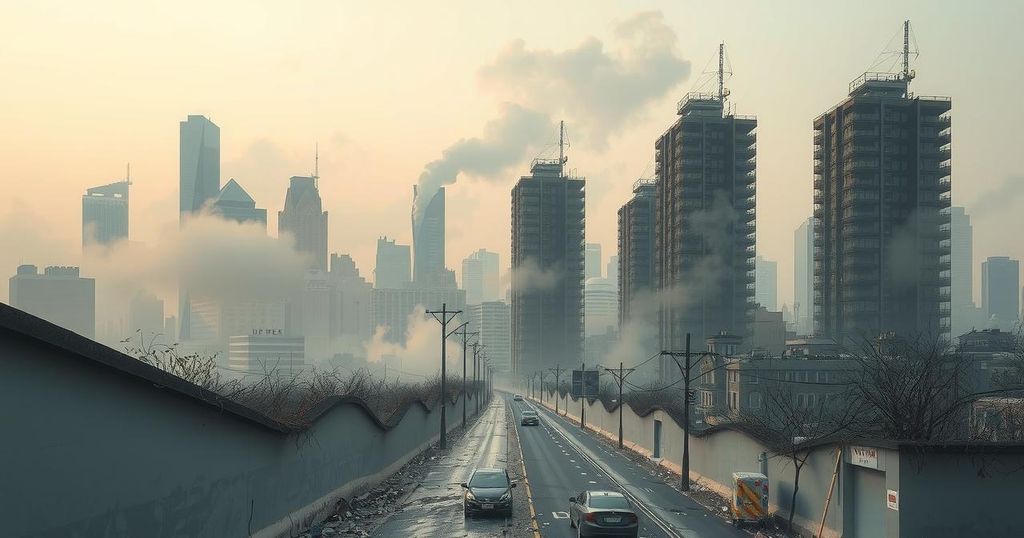Ghana and Africa Face Critical Air Pollution Crisis, 2024 Report Reveals
The 2024 World Air Quality Report identifies Ghana, Nigeria, Chad, and Rwanda among the most polluted countries globally, with alarming PM2.5 levels that pose severe health risks. Chad’s PM2.5 concentration is 91.8 µg/m³, nearly 18 times above WHO guidelines. The report highlights a public health emergency in Ghana, where air pollution is linked to 28,000 annual deaths, necessitating urgent action to improve air quality and safeguard citizens’ health.
The 2024 World Air Quality Report reveals concerning pollution levels in Africa, with countries including Ghana, Nigeria, Chad, and Rwanda prominently featured among the most polluted globally. This report reflects a significant air quality crisis that threatens the well-being of millions across the continent.
Chad, with an alarming PM2.5 concentration of 91.8 µg/m³, leads the world in pollution, exceeding the World Health Organization’s recommended annual guideline by nearly 18 times. Following Chad, Rwanda and Nigeria recorded PM2.5 levels of 40.8 µg/m³ and 40.1 µg/m³, respectively, while Ghana ranked 14th with a PM2.5 concentration of 35.8 µg/m³.
PM2.5 particles pose severe health risks as they infiltrate the lungs and bloodstream, leading to respiratory and cardiovascular diseases. These dangerous pollutants, being significantly smaller than dust and human hair, are linked to premature death, with evidence suggesting that air pollution shortens lifespans by 2.7 years in highly affected areas. In Ghana alone, air pollution resulted in an estimated 28,000 deaths in 2019.
Specifically in Ghana, air pollution levels have risen drastically. Accra, the capital, has been reported as the 16th most polluted capital city globally, while Kumasi emerged as the most polluted city in Ghana for the first time with a PM2.5 level of 39.5 µg/m³. Over recent years, Ghana’s pollution rank escalated from 27th in 2022 to 14th in 2024.
The African continent struggles with overwhelming pollution and inadequate air quality monitoring. The 2024 report indicates that five of the top ten polluted countries are in Africa, alongside alarmingly limited data collection, as only 24 out of 54 nations reported air quality figures.
Air pollution in Ghana escalates into a public health emergency, where approximately 28,000 deaths occur each year due to toxic air, equating to one death every 19 minutes. With PM2.5 levels on the rise, the economic implications are grave—potentially costing Ghana’s economy $137.8 billion by 2040 without immediate action.
Despite a grim global context in which only 17% of cities meet WHO pollution standards, some regions, such as Nieuwoudtville in South Africa, have attained acceptable air quality levels. The report emphasizes the need for urgent interventions to address these environmental health issues.
Key drivers of pollution in Africa include rapid urbanization, increased industrial activity, and inadequate regulatory frameworks. To combat this crisis, experts advocate for stricter vehicle emissions regulations, investments in renewable energy, expansion of monitoring initiatives, and the implementation of strict anti-burning policies. With Ghana’s rising pollution rates, concerted efforts are essential to avert a public health disaster.
In conclusion, the 2024 World Air Quality Report highlights the severe air pollution crisis in African nations, including Ghana, Nigeria, Chad, and Rwanda. The rising PM2.5 levels pose significant health risks and could result in devastating economic losses if unaddressed. Urgent measures, including regulation reforms and investment in clean energy, are crucial for combating this escalating public health emergency, particularly in Ghana, where air quality continues to deteriorate.
Original Source: www.myjoyonline.com




Post Comment